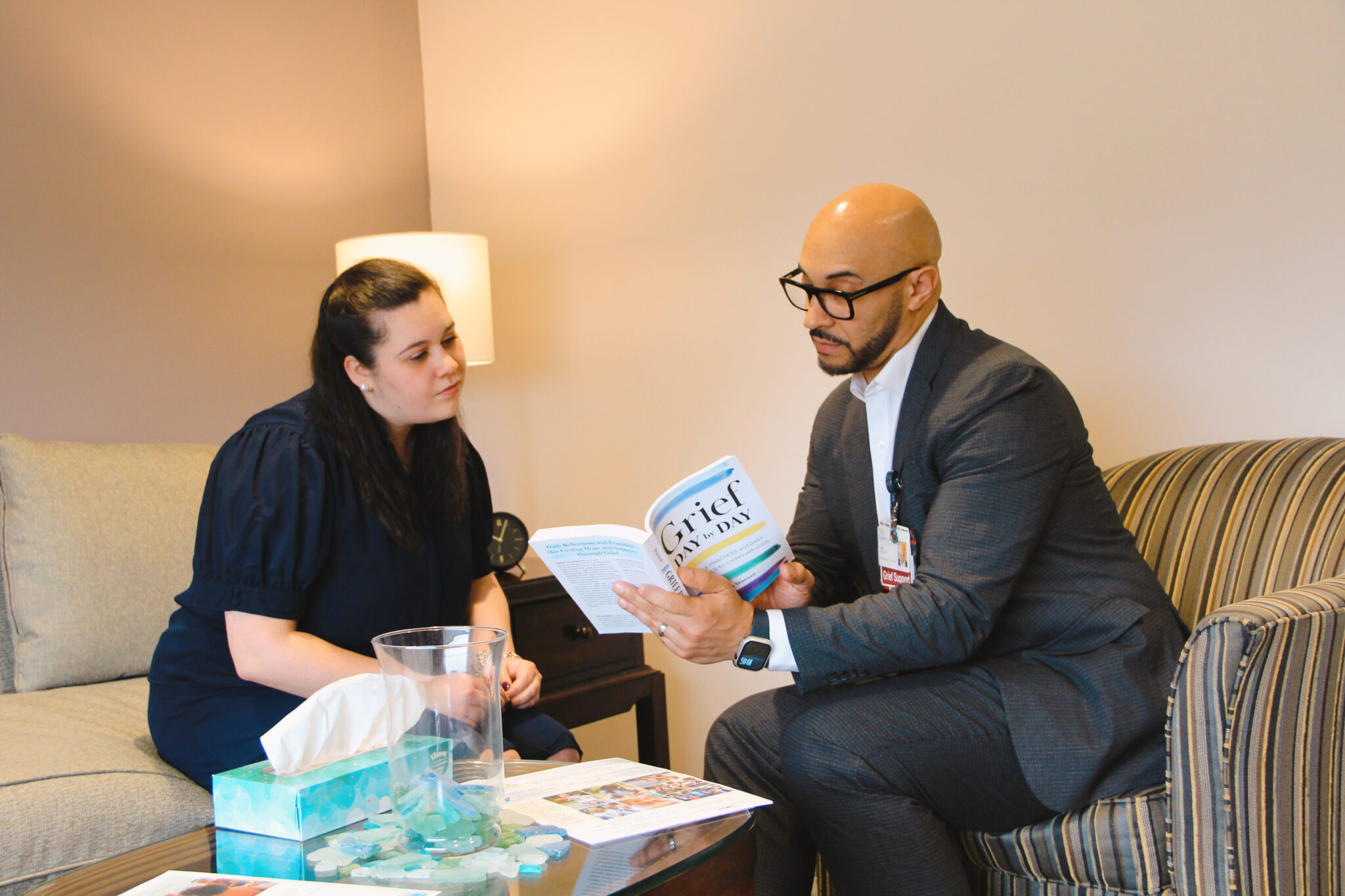When someone you care about is grieving, of course you want to help — but knowing how can be intimidating. Should you reach out? Give them space? Say something? Stay silent?
As a HopeHealth grief counselor, Brianna O’Rourke understands the uncertainty. She also understands that supporting someone through grief isn’t about fixing their pain — it’s about honoring it.
“Grief is love with nowhere to go — and it continues to exist each and every day moving forward,” Brianna says. “So to support someone through grief, it’s really about showing up with compassion, and meeting them where they are. That means more than you might ever realize.”
Here are suggestions.
> Are you coping with grief and loss? HopeHealth offers free, virtual grief support groups.
1. Let them know, “I’m here for you.”
“When a friend has lost someone, it’s OK not to know exactly what to say,” says Brianna. “There’s never going to be a perfect thing to say or do.”
Try keeping it simple and heartfelt:
- “I can’t imagine how difficult this must be.”
- “I’m here to support you in whatever way you need.”
- “However you’re feeling is okay.”
And remember: “Sometimes there might not be any words,” says Brianna. “Maybe it’s a hug; just being that physical presence and support.”
2. Offer specific help.
Amid their grief, your friend may struggle to keep up with the grind of daily life — and be too overwhelmed to ask for support. Instead of an open-ended “Let me know what I can do,” suggest concrete help.
For example:
- Drop off a meal
- Pick up a child from school
- Help with errands or household chores
- Accompany them to an appointment or event
“Small acts of kindness show you’re present and thinking of them, even when they might not have the energy to ask,” says Brianna.
> Related: 25 ways to support a family caregiver
3. Offer to listen, too.
In grief, few things are as comforting as a sounding board. Whether you’re texting from afar or meeting in person, try asking your friend gentle questions like, “How has your grief been? Do you want to talk about it?”
They might pass on the offer. They might open up. Either way, they’ll know they don’t have to hide their grief from you.
“It’s all about creating spaces for that grieving person to feel listened to and validated,” says Brianna.
4. Follow their lead.
We all have ideas about grief from our own experiences — but when we show up to support a friend, it’s important to leave those comparisons at the door.
Even people grieving the same loss — such as siblings mourning a parent — may cope in different ways. Some people want to sort through belongings right away; others need months or years. Some people find comfort when others share stories or say their loved one’s name. For others, it may feel triggering.
“Everyone’s grief journey is different — and there are so many depths and layers to it,” says Brianna. “Take your cues from the person who is grieving, and focus on meeting them wherever they’re at.”
> Related: Where to put your love when you’ve lost someone special
5. What not to say: “Look on the bright side.”
For all our good intentions, rushing to find the positive can make someone who’s grieving feel more alone — like they should be putting on a brave face instead of acknowledging their pain.
Try to avoid phrases like:
- “Your loved one is in a better place.”
- “Everything happens for a reason.”
- “This is behind you now.”
Instead, say something like “I can’t imagine how difficult this must be.” That opens the door for the grieving person to share how they’re really doing, if they want to.
“Let them guide the conversation,” says Brianna. “It’s about walking alongside them, not leading the way.”
6. Keep showing up.
Many people receive an outpouring of support in the first weeks after a loss. But long after the condolence notes stop, their grief continues.
“Anniversaries, birthdays and holidays can be especially difficult for someone who is grieving,” says Brianna. “Even in unexpected moments, other secondary losses can surface — like missing how their loved one made them feel, or the routines they shared, or the future they’d imagined together.”
Continue to check in, even months later. Around meaningful dates like anniversaries, a simple text or card — “Thinking of you today” — can mean a lot. At any time of year, a quick note to say, “Thinking of you. No need to write back,” can be a gentle reminder they’re still in your thoughts.
> Read: Tips for coping with grief on Valentine’s Day
7. Encourage supportive outlets
If your friend lives in Rhode Island or Massachusetts, they may be able to join one of HopeHealth’s free grief support groups. That said, healing can also happen in many other places: one-on-one counseling; community centers and faith groups; books and online resources; and activities like art, meditation or making a grief playlist.
You can help by researching and sharing resources for your friend to consider — if and when they feel like it.
“There’s no right or wrong way to heal from a loss. What matters is what’s helpful to that person,” says Brianna. “Let them know you’re walking alongside them. It’s their story, their journey — you’re just there to support them in the ways that matter most to them.”

